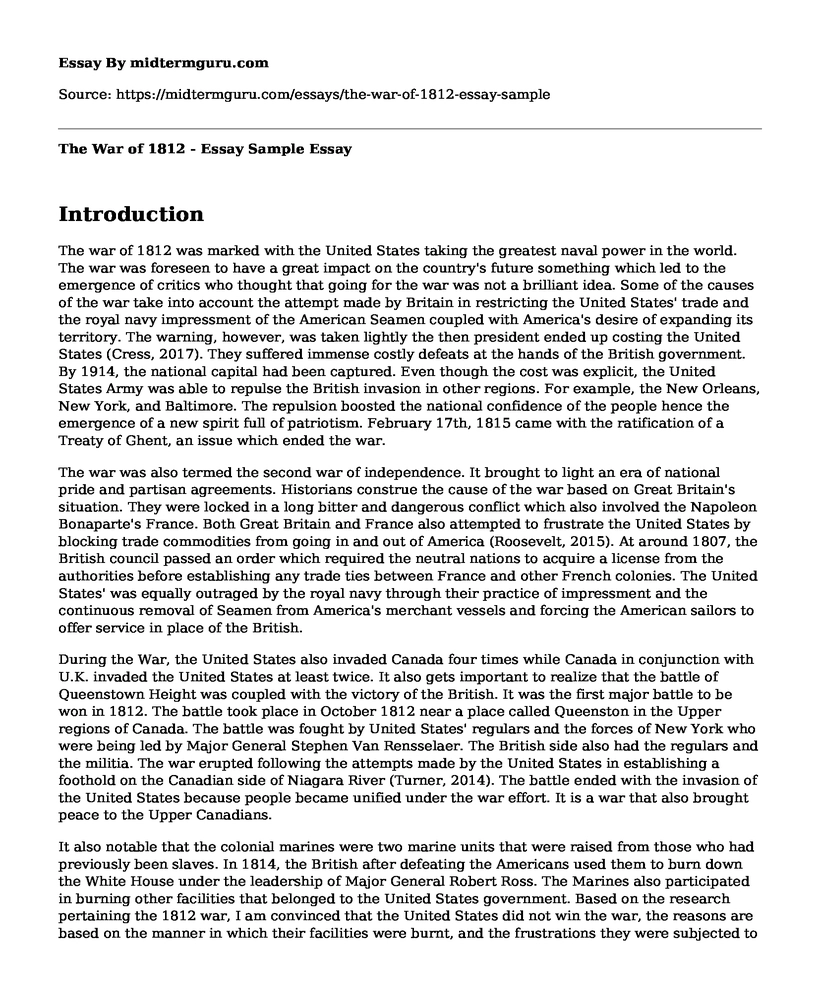Introduction
The war of 1812 was marked with the United States taking the greatest naval power in the world. The war was foreseen to have a great impact on the country's future something which led to the emergence of critics who thought that going for the war was not a brilliant idea. Some of the causes of the war take into account the attempt made by Britain in restricting the United States' trade and the royal navy impressment of the American Seamen coupled with America's desire of expanding its territory. The warning, however, was taken lightly the then president ended up costing the United States (Cress, 2017). They suffered immense costly defeats at the hands of the British government. By 1914, the national capital had been captured. Even though the cost was explicit, the United States Army was able to repulse the British invasion in other regions. For example, the New Orleans, New York, and Baltimore. The repulsion boosted the national confidence of the people hence the emergence of a new spirit full of patriotism. February 17th, 1815 came with the ratification of a Treaty of Ghent, an issue which ended the war.
The war was also termed the second war of independence. It brought to light an era of national pride and partisan agreements. Historians construe the cause of the war based on Great Britain's situation. They were locked in a long bitter and dangerous conflict which also involved the Napoleon Bonaparte's France. Both Great Britain and France also attempted to frustrate the United States by blocking trade commodities from going in and out of America (Roosevelt, 2015). At around 1807, the British council passed an order which required the neutral nations to acquire a license from the authorities before establishing any trade ties between France and other French colonies. The United States' was equally outraged by the royal navy through their practice of impressment and the continuous removal of Seamen from America's merchant vessels and forcing the American sailors to offer service in place of the British.
During the War, the United States also invaded Canada four times while Canada in conjunction with U.K. invaded the United States at least twice. It also gets important to realize that the battle of Queenstown Height was coupled with the victory of the British. It was the first major battle to be won in 1812. The battle took place in October 1812 near a place called Queenston in the Upper regions of Canada. The battle was fought by United States' regulars and the forces of New York who were being led by Major General Stephen Van Rensselaer. The British side also had the regulars and the militia. The war erupted following the attempts made by the United States in establishing a foothold on the Canadian side of Niagara River (Turner, 2014). The battle ended with the invasion of the United States because people became unified under the war effort. It is a war that also brought peace to the Upper Canadians.
It also notable that the colonial marines were two marine units that were raised from those who had previously been slaves. In 1814, the British after defeating the Americans used them to burn down the White House under the leadership of Major General Robert Ross. The Marines also participated in burning other facilities that belonged to the United States government. Based on the research pertaining the 1812 war, I am convinced that the United States did not win the war, the reasons are based on the manner in which their facilities were burnt, and the frustrations they were subjected to by the colonial marines.
References
Cress, L. D. (2017). Citizens in Arms: The Army and Militia in American Society to the War of 1812. UNC Press Books.
Roosevelt, T. (2015). The naval war of 1812. Dead Dodo History via Publish Drive.
Turner, W. (2014). British generals in the War of 1812: high command in Canada. McGill-Queen's Press-MQUP.
Cite this page
The War of 1812 - Essay Sample. (2022, Sep 28). Retrieved from https://midtermguru.com/essays/the-war-of-1812-essay-sample
If you are the original author of this essay and no longer wish to have it published on the midtermguru.com website, please click below to request its removal:
- How Hitlers Ideas Interacted With the Attitudes of Ordinary Germans
- Essay Example: The Fourteenth Amendment
- Civil Rights Events - Paper Example
- The Epic of Sundiata - Paper Example
- Spanish Civil War: The 3-Year Conflict Between 1936-1939 - Essay Sample
- A Look at America's History from 1866-1980 - Essay Sample
- Book Analysis Essay on Street Without Joy by Bernard Fall







